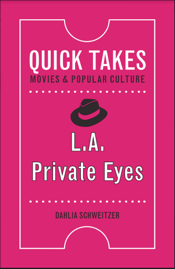
About Dahlia
DAHLIA SCHWEITZER is a pop culture critic, writer, and professor. Described by Vogue as “sexy, rebellious, and cool,” Schweitzer writes about film, television, music, gender, identity, and everything in between. She studied at Wesleyan University, lived and worked in New York City and Berlin, and completed her MA and PhD at the Art Center College of Design and UCLA. She is currently chair of the Film and Media department at the Fashion Institute of Technology in New York City.
In addition to her books, Dahlia has essays in publications including Cinema Journal, Journal of Popular Film and Television, Hyperallergic, Jump Cut, Quarterly Review of Film and Video, and The Journal of Popular Culture. She has also released several albums of electronic music, including Plastique and Original Pickup.

Professor
As a professor of film and media studies, Dahlia exposes her students to a variety of theoretical approaches and cinematic techniques, asking them to approach both with analytical inquisitiveness. Her aim is to pass her own curiosity on to her students, encouraging them to think across their classes and experiences to create intellectual connections between course materials and the world in which they live. She strives to remind her students that the loudest voice is not necessarily correct, and in so doing, helps them find their own.

Media Critic
Declared “one of the world’s leading analysts of popular culture” by renowned author Toby Miller, Dahlia writes about film, television, music, gender, identity, and everything in between. Her work can be found across mainstream, academic, and emergent channels in both long and short form. Repeatedly drawn to popular culture, Dahlia loves to analyze and unpack cultural artifacts in order to explore how they reflect social and historical issues, as well as looking at how they reinforce or interrogate common cultural assumptions.

Author
Dahlia has written numerous books exploring aspects of film and television. Regardless of the topic—serial killers, private detectives, or even zombies—all of her writing engages directly with questions of self versus other, private versus public space, examining depictions of gender, identity, and race. She traces how these depictions evolve and examines what they mean about our changing world. In her latest project, Dahlia explores the ways haunted homes have become a venue for dramatizing anxieties about family, gender, race, and economic collapse.
Blog
Slut-Shaming: The Gift that Keeps on Giving
I’ve received several responses to one of my recent blog posts that accuse me of slut-shaming. I’ve received enough of these responses that I feel the need to clarify a couple things. In the 1960s, media theorist Marshall McLuhan became famous for the phrase "the medium is the message." However, his less-known maxim, "Faced with information overload, our only option is pattern recognition," may turn out to be the more useful of the two. Now, fifty years later, it seems to me that we're in a...
Rethinking Miley
“I never meant to start a war. I just wanted you to let me in.” Miley Cyrus, “Wrecking Ball” I keep telling myself that the conversation with Miley is over (didn’t she reach media saturation weeks ago?), but I can’t stop. I just watched her performance on Saturday Night Live, and it changed everything. It’s transparently obvious to me now that her performance at the VMAs was a stunt to gain attention (even stiff Lady Gaga and deer-in-the-headlights Katy Perry couldn’t come close to grabbing a...
On “Real” Men
There has been a conversation on my Twitter feed about my use of the phrase "real men" in my "keeping sex complicated" post. I'd like to post what my friend Sean Patrick Sullivan had to say on the issue, as he says it better than me: When one refers to a real man or woman, what one is saying is that they are mature, responsible, self-aware, capable of giving and receiving love, and grown-up beyond the point of mere boy- or girlhood. Our collective refusal to valorize and insist upon minimum...




